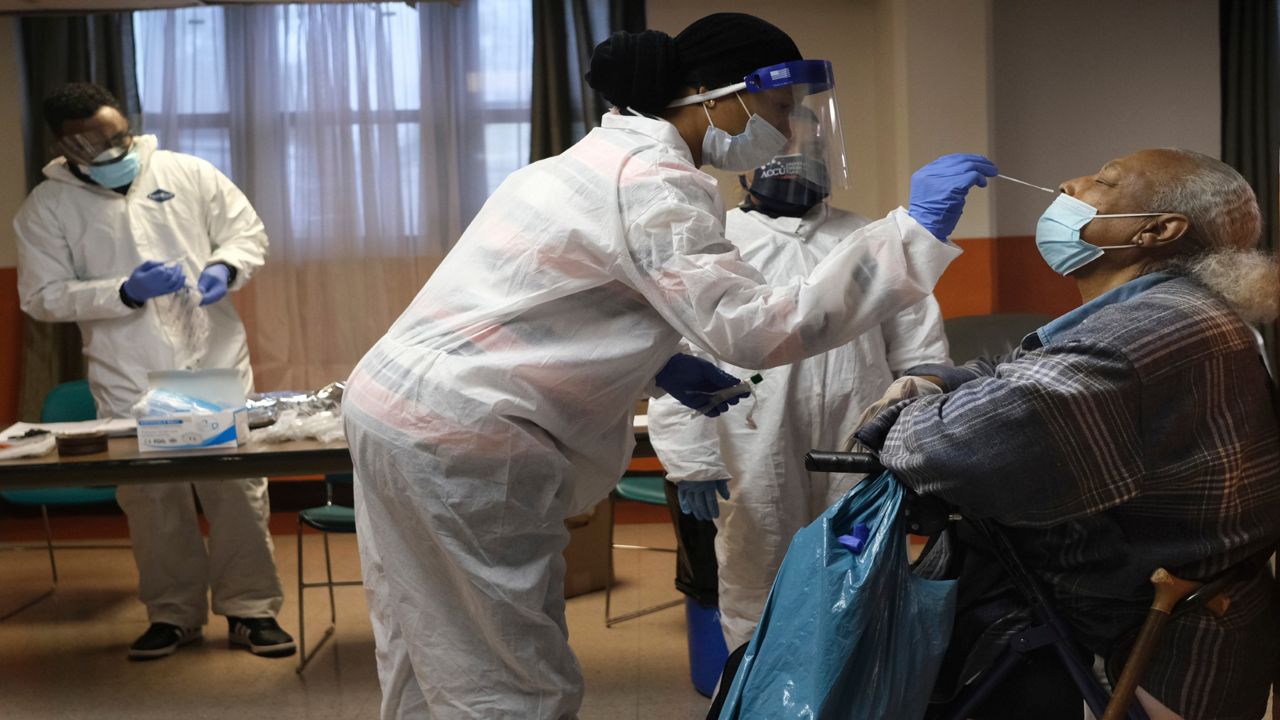The city's top doctor is urging people over the age of 65 and those with underlying conditions to avoid nonessential activities, a sign that New Yorkers may be facing a tough winter.
The health commissioner’s notice comes amid a wave of COVID-19 infections and increase in hospitalizations across the city and state.
“We are fighting with everything we’ve got against this second wave bearing down on us, but we have the tools to fight back in so many ways,” said Mayor Bill de Blasio at his daily press briefing on Tuesday. “And we particularly have to remember what we learned in the spring about who is most vulnerable and the special precautions that need to be taken when it comes to our seniors and folks with preexisting conditions.”
Hospitals have reported more than 1,100 COVID-19 patients, according to Health Commissioner Dave Chokshi. That’s twice as many as less than three weeks ago and the highest number since early June. The city’s daily coronavirus infection rate on Tuesday was 5.72% and the 7-day average was 4.14%.
While the notice was directed specifically at seniors over 65 years old and people with pre-existing conditions, the health commissioner and mayor emphasized the importance of everyone taking precautions.
“It takes a whole community to beat back a pandemic,” Dr. Chokshi said. “That's why the commissioner’s notice I’m issuing today is just one step. We need you to carry the message forward to help protect at-risk New Yorkers.”
Seniors Say They've Already Altered Their Behavior Amid the Pandemic
Brooklyn resident Ann Maldonado is one of those people considered to be at risk. While the pandemic and colder weather has moved many of her activities indoors, she said it’s her choice when she stays home and she’s not going to let anyone tell her what to do.
"Why should we be treated as though we are incarcerated?" she said.
Maldonado said she didn't need an advisory to know how to take care of herself. Since the start of the health crisis, she’s been using Zoom a lot to avoid any unnecessary contact or travel.
Weekdays, she’ll spend hours taking part in programming offered by the city’s Department for the Aging because all their senior centers are closed for in-person programming. As it turns out, Maldonado likes this format better. It also allows her to spend more time with her granddaughter Miracle.
Margo, who is 66, also takes part in virtual activities, but does it with the non profit Selfhelp Community Services. She, too, said the commissioner’s advisory won’t change her behavior either.
"I've already been heeding that advice," she said. "I really don’t see that it's much different from what Ive been hearing all along."
Places like Selfhelp have worked hard to adapt their services to ensure their 20,000 clients stay connected, even when they can’t in person. They do it using a “virtual” senior center.
“We are able to bring our clients together through actual formal classes or for special events such as Hanukkah," said Stuart Kaplan, the CEO of Selfhelp Community Services.
City Details Steps Taken to Prep for Increase in Hospitalizations
Dr. Mitchell Katz, the CEO of Health + Hospitals, also detailed the steps the city’s taken to prepare for an increase in hospitalizations due to COVID-19. This follows Governor Cuomo’s announcement yesterday on the state’s plans to expand hospital capabilities amidst this rise in infections.
ICUs across the system’s 11 hospitals are at two-thirds capacity, leaving one-third of their facilities open for new cases, Dr. Katz said. With a three-month supply of PPE and new ventilators purchased over the summer, he said that “equipment is a nonissue for us at this moment.”
Hospital spaces and rooms have also been equipped to adequately clear the air and protect health care workers, he said. They’ve also added cameras and audio monitors to better communicate with patients and limit in-person interaction as much as possible.
“We’ve learned a lot about how to take care of this disease,” Dr. Katz said. “Providing people who are short of breath steroids makes a huge difference and shortens hospitalization which is undoubtedly one of the reasons why we are not overwhelmed despite the growth of cases that we've seen.”
He went on to say that the city’s also learned that not all patients need to be intubated when they become short of breath and are better served by giving them a high flow of oxygen. This saves intubation for patients who do require it.
“It’s a combination of preparing our facilities and being able to better care for patients so we do not become overwhelmed,” said Dr. Katz.
The mayor also announced a city initiative to increase donated blood supply. The city’s ideal blood supply is enough to last seven days. The current supply is at three days due to a marked decrease in public blood drive events. The city’s goal is to get 25,000 people to donate by the end of this month.
